The Racket

Brief Synopsis
Cast & Crew
John Cromwell
Robert Mitchum
Lizabeth Scott
Robert Ryan
William Talman
Ray Collins
Film Details
Technical Specs

Synopsis
During a meeting with the governor, Harry Craig, the lead investigator on the state's crime commission, reveals his suspicion that Assistant State's Attorney Roy Higgins is in league with a large syndicate run by a mysterious figure known only as "The Old Man." After the governor pledges to help the commission if it can come up with proof of Higgins' guilt, Craig and his cohorts prepare to confront Higgins with their accumulated evidence. Before Higgins' interrogation, however, Nick Scanlon, a vicious gangster who recently joined forces with The Old Man, orders his thug, Durko, to kill him. Driving away from the murder scene, Durko is recognized by police officer Bob Johnson, who then issues a wanted notice for the parolee. Johnson's efforts are commended by his precinct captain, Tom McQuigg, a tough policeman who has refused to be bribed by the powerful syndicate. Less than pleased with Johnson is Sgt. Turk, an investigator with the state's attorney office who is loyal to the syndicate, and judicial candidate Mortimer X. Welsh, the syndicate's replacement for Higgins. After McQuigg visits Nick, a childhood friend, and warns him not to cause trouble in his precinct, a bomb explodes outside McQuigg's house, unnerving his devoted wife Mary. Patrol officers spot a sedan near the scene and pursue the car until the two men inside crash and flee on foot. McQuigg corners one thug on a rooftop and fights with him until he accidentally falls to his death. Sure that the other suspect is Nick's younger brother Joe, McQuigg sends Johnson to the nightclub where Joe's girl friend, singer Irene Hayes, works. There, Johnson runs into cub reporter Dave Ames, an old Marine buddy who is infatuated with Irene. As Dave watches, Johnson arrests Joe for stealing the Rolls Royce he is driving. McQuigg then arrests Irene as a material witness. Nick, who dotes on his brother, pressures Welsh to get Joe released, and using his connections, Welsh arranges for a judge to issue a writ of habeas corpus . Irene, whom Nick hates, is not bailed out, however, and when Joe brushes her off, she screams that she is going to tell all. Based on Irene's statements about Joe's involvement in Higgins' death, McQuigg orders Joe re-arrested and keeps Irene jailed. Later, Johnson is visited at home by Dave and uses him to set a trap for Durko and another thug, who have been sent by Nick to murder Johnson. Dave leads the killers inside, where Johnson surprises and outdraws them. Nick, meanwhile, meets with R. G. Connolly, The Old Man's right-hand man, and expresses concern about Irene. Connolly, a businessman, tries to convince Nick not to resort to violence but allow the syndicate to handle the problem quietly. Nick, however, insists that his way, the old way, is best. Nick then walks into McQuigg's precinct and demands to see Irene. Deducing Nick's identity, Johnson insults the gangster and is shot. As he is leaving, Nick tussles with Dave, who delays him long enough for the police to initiate a pursuit. After Johnson, an expectant father, dies from his wound, the police force Nick's car to crash. As soon as Nick is arrested, Welsh and Turk produce a writ to free him, but McQuigg tears it up in disgust. McQuigg then reveals that both Irene and Dave are prepared to testify against Nick and produces the gun that killed Johnson, which is covered with Nick's fingerprints. Welsh calls The Old Man for orders, then nervously informs Nick that he must stay in jail until after the election. Furious, Nick declares that he will expose the syndicate and ruin Welsh and Turk. Thus trapped, Welsh and Turk decide to help the unguarded Nick flee, but McQuigg, having anticipated all their moves, stops him. As Nick makes a final, desperate escape attempt, Turk shoots and kills him. Later, after Turk and Welsh receive subpoenas from the Crime Commission, and Irene and Dave contemplate their future together, Mary drives an exhausted McQuigg home.

Director

John Cromwell
Cast

Robert Mitchum

Lizabeth Scott
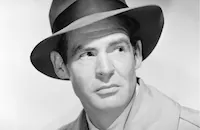
Robert Ryan

William Talman
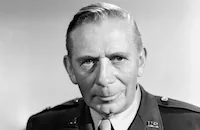
Ray Collins

Joyce Mackenzie

Robert Hutton

Virginia Huston

William Conrad

Walter Sande

Les Tremayne

Don Porter
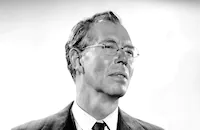
Walter Baldwin
Brett King
Richard Karlan

Tito Vuolo
Howland Chamberlin
Ralph Peters

Iris Adrian
Jane Hazzard
Claudia Constant
Jack Shea
Mike Lally
Howard Joslin
Bret Hamilton
Joey Ray
Eric Alden
Miles Shepard
Hazel Keener
Dulcie Day
Steve Roberts
Pat Flaherty
Duke Taylor
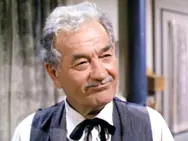
Milburn Stone
Max Wagner
Richard Reeves
Johnny Day
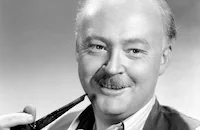
Don Beddoe
Matthew Boulton
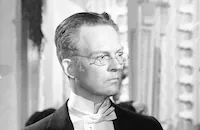
Don Dillaway
Barry Brooks
George Sherwood
Jack Gargan
Herb Vigran

Bud Wolfe
Ronald Lee
Dick Gordon
Allen Mathews
Ralph Montgomery
Al Murphy
Bob Bice
Sally Yarnell
Jane Easton
Kate Belmont
Harriet Matthews
Curtis Jarrett
Art Dupuis
Harry Lauter
Ed Parker
Crew
Harold Adamson
C. Bakaleinikoff
Paul Baxley
Mel Berns
Cliff P. Broughton
W. R. Burnett
James Casey
Albert S. D'agostino
John Daheim
George E. Diskant
Lowell J. Farrell
Samuel Fuller
Larry Germain
Saul Gorss
Edmund Grainger
Edmund Grainger
William Wister Haines
Howard Hughes
Carey Loftin
Jimmy Mchugh
Frank Mcwhorter
Jack Okey
Clem Portman
Nicholas Ray
Darrell Silvera
Art Siteman
William Stevens
Sherman Todd
Dale Van Sickle
Michael Woulfe

Photo Collections
Videos
Movie Clip


Trailer
Film Details
Technical Specs

Articles
The Racket (1951)
Mitchum, in a change of pace, plays an honest metropolitan cop whose criminal nemesis (Robert Ryan) is trying to gain control of the city government. A district attorney (Ray Collins) and a police inspector (William Conrad) have already been corrupted by Ryan, and they don't take kindly to Mitchum's sense of honor. Ryan's character is a certifiable loose cannon, so a lot of excitement arises out of watching him freak out over the increasingly tense situation. To be honest, the conventions of the crime genre aren't exactly tested by the rather flat narrative, but that doesn't lessen the lead actors' charisma. Ryan and Mitchum bounce moments off of each other like old pros; some viewers might even feel that Ryan walks away with the picture.
Directed (for the most part) by John Cromwell, The Racket was a remake of a film that Hughes produced in 1929. It, in turn, was an adaptation of a stage play that starred Edward G. Robinson and...John Cromwell! Cromwell may have been exceptionally familiar with the material, but Hughes wasn't pleased with his cut of the film. After Cromwell (who Ryan described as "very old and sick") left Hollywood in disgust, Hughes called in Nicholas Ray to shoot a few more scenes. Sherman Todd and Tay Garnett also filmed some short sequences and inserts. It's amazing the picture holds together as well as it does.
By this point, Mitchum had already done a brief stint on a chain gang for possession of marijuana (possession laws were much stricter in those days), but the pursuit of pot still seemed to take up an inordinate amount of his time. Mitchum would go to great lengths to get his hands on a joint, and Hughes - who Mitchum referred to as "The Phantom" - was usually on the lookout for any illicit activity from his star. Mitchum was even convinced that his dressing room was bugged, and would stop in the middle of private conversations to chide Hughes for listening in.
Even though Mitchum's lifestyle made Hughes nervous, he still seemed enthralled with the actor's devil-may-care demeanor. He had a habit of updating Mitchum's telephone number whenever it changed, just in case he wanted to get together with him. This didn't happen very often, but Hughes once called Mitchum in the middle of the night and drove him to see his famous, gargantuan airplane, The Spruce Goose. He had heard that Mitchum used to work in a Lockheed plant, so he thought they could have a nice conversation concerning the technical aspects of flight. But, much to the billionaire's chagrin, Mitchum wasn't the least bit interested in the plane.
Actor Jim Backus, who socialized with both Hughes and Mitchum, thought he understood their relationship. "Howard was an attractive man," Backus once said. "He was a rich man. He wielded a lot of power, but I think he secretly would have liked to have been Bob Mitchum. Because of who he was, Howard's conquests were unquestionably staggering. But Bob Mitchum could have gone right on being a bum, and beautiful women would have still fallen all over him. And I think Howard was canny enough to realize that."
Reportedly, Hughes even offered to let Mitchum run RKO at one point, but Mitchum told the billionaire that he'd be far better off giving the job to Dick Powell. This may have been the only time that anyone in Hollywood ever suggested that Dick Powell could fill in for Robert Mitchum, and it was Mitchum who did it!
Director: John Cromwell, Nicholas Ray
Producer: Edmund Grainger
Screenplay: William Wister Haines, W.R. Burnett (based on the play by Bartlett Cormack)
Cinematographer: George E. Diskant
Editing: Sherman Todd
Music: Paul Sawtell, Roy Webb
Art Direction: Albert S. D'Agostino, Jack Okey
Costumes: Michael Woulfe
Principal Cast: Robert Mitchum (Capt. McQuigg), Lizabeth Scott (Irene), Robert Ryan (Scanlon), William Talman (Johnson), Ray Collins (Welsh), Joyce Mackenzie (Mary McQuigg), Robert Hutton (Ames), Virginia Huston (Lucy Johnson), William Conrad (Turk), Walter Sande (Delaney), Les Tremayne (Chief Craig), Don Porter (Connolly), Walter Baldwin (Sullivan), Brett King (Joe Scanlon).
B&W-89m. Closed captioning.
by Paul Tatara

The Racket (1951)
Quotes
Trivia
Notes
According to a March 1951 Hollywood Reporter news item, Senator Estes Kefauver, who at the time of this film's production was head of the Senate Crime Investigating Committee, pledged his cooperation on the making and presentation of the picture. The 1950-51 Crime Investigating Committee, also known as the Kefauver Committee, probed the workings of organized crime and proved that it existed on a national level, primarily in the form of two "families," a Chicago-Miami family headed by Tony Acardo, and a New York-Miami family headed by Joe Costello. The committee documented the paper trails of known gamblers, exposing their illegal interstate commerce through the sale of wire services. Although no hard, indictable evidence was collected, testimony before the committee revealed that these syndicates were also involved in legitimate businesses and attempted to control their competition through extortion and other strong-arm tactics. For more information about the Kefauver Committee, see the entry above for The Kefauver Crime Investigation.
Reviewers noted that the committee's findings legitimized the film and helped it overcome censorship problems. According to information in the MPAA/PCA collection at the AMPAS Library, early drafts of The Racket faced strong opposition from PCA director Joseph I. Breen. In a November 27, 1950 letter to RKO executive Harold Melniker, Breen rejected the first draft as "thoroughly and completely unacceptable under the provisions of the Production Code." Breen described the script as "shocking" and a "new low in crime screen stories," and urged RKO not to pursue the project further. On November 30, 1950, however, Breen submitted to RKO a long list of suggestions on how to make the story acceptable. Objecting strenuously to the depiction of the film's "community" as "completely lawless," Breen recommended that violent scenes and moments, such as the burning of "Higgins'" body, be eliminated, and that judges and other public officials be characterized as honest, with few exceptions. In addition, Breen insisted that "Irene" not be portrayed as a prostitute. By mid-December 1950, Breen approved a revised version of the script, on condition that all references to prostitution, particularly comic ones, be removed, and that the ending make clear that "Turk" is to be punished for killing "Nick." In the final film, Irene is a portrayed as a legitimate entertainer, and both Turk and "Welsh" are served with subpoenas after Nick's death.
Hollywood Reporter news items add the following information about the production: In May 1950, Sam Fuller was assigned to work on the film's screenplay and was considered as a possible director. Shelley Winters was announced as the picture's female star in January 1951. Nicholas Ray directed added scenes in late June 1951, and during the filming, producer Edmund Grainger filled in as director for a day. Although a post-production news item announced that RKO composer Paul Sawtell was working on the production, he was not listed in the onscreen credits; his contribution to the final film has not been confirmed. Modern sources Howard Petrie and William Forrest to the cast. Production files contained at the UCLA Arts-Special Collections Library indicate that location shooting took place in North Hollywood, downtown Los Angeles and the RKO Ranch in Encino, CA.
The first screen version of Bartlett Cormack's play, the 1928 film The Racket, also was presented by Howard Hughes and was directed by Lewis Milestone. Thomas Meighan and Louis Wolheim starred in the earlier version, which focused on the exploits of a bootlegger (see AFI Catalog of Feature Films, 1921-30).

Miscellaneous Notes
Released in United States Fall November 1951
Released in United States on Video April 25, 1990
Wide Release in United States December 12, 1951
Completed shooting May 14, 1951.
Released in United States on Video April 25, 1990
Released in United States Fall November 1951
Wide Release in United States December 12, 1951














